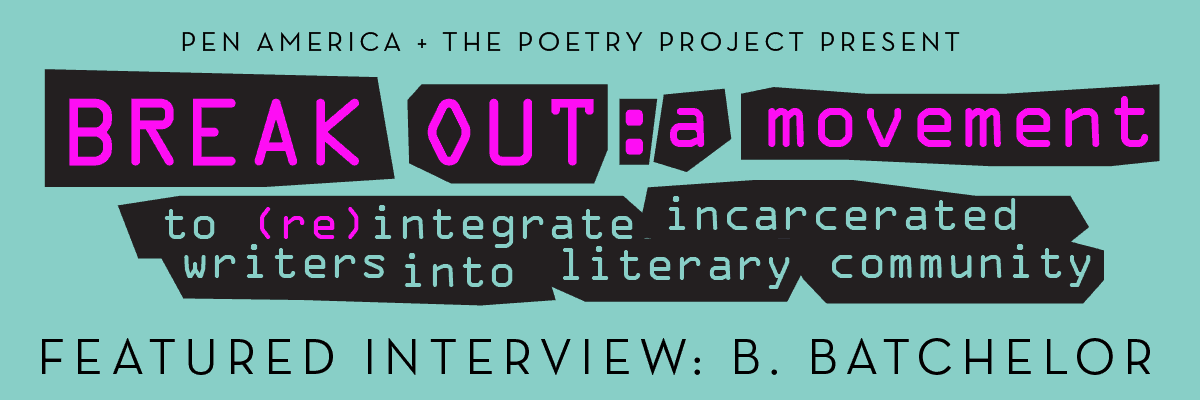Works of Justice is an online series that features content connected to the PEN America Prison and Justice Writing Program, reflecting on the relationship between writing and incarceration, and presenting challenging conversations about criminal justice in the United States. In this installation, Sarai Hertz-Velázquez asks poet B. Batchelor about his craft and his experience as an incarcerated writer.

This September, in commemoration of the Attica Riots, PEN America and The Poetry Project launch BREAK OUT: a movement to (re)integrate incarcerated writers into literary community. Throughout the month, over two dozen local reading series in New York City—and across the country—will feature the work of a currently incarcerated writer. One of our featured writers is B. Batchelor. Learn more about the effort here.

Thirty-six-year-old Minnesota-raised poet B. Batchelor believes: “A writer is a witness who records the truth.” And that’s exactly what he does—speaks his truth poem by poem. Batchelor’s language lays out the hard realities of incarceration, while challenging conventional narratives of the justice system painted by mass media. With audacious authenticity and an intense, yet surprisingly graceful emotional undertow, Batchelor is a poet whose passion is ingrained in his writing, but extends far beyond the page.
Since, he’s grown into a published poet with an active commitment to literary citizenship. Finding solace and purpose in the act of exchanging work with fellow writers, Batchelor is a cofounder of the Stillwater Writers Collective, a self-organized group of writers in the Minnesota Correctional Facility-Stillwater, as well as the Minneapolis Prison Writers Workshop and PEN America Prison Writing Mentor Program. In a former biography, Batchelor writes that a poetry mentor helped him frame the art form “as a tool of rehabilitation and reclamation.” Now, Batchelor finds poetry to be his “greatest source of expression and freedom.”
B. Batchelor was also featured in our Exposure: On Writing in Prison event at the 2019 PEN America World Voices Festival where Christopher Soto read his piece. He has won multiple awards in the PEN America Prison Writing Awards, including the poem “Dear Voyage,” which won first place in 2014-2015. B’s poetry has been published in Columbia: A Journal of Literature & Art, Cream City Review, The Laurel Review, and other journals. He is currently working on his debut poetry collection.
SARAI HERTZ-VELÁZQUEZ: In your poem “Disfigured Hours” you write:
“I mean barred holes, I mean
bars over hot coals stoked
by badged mouths
that form person
but say property.”
In my reading, your use of “person” to “property” feels like a critique of the criminal justice system, and how it erases the humanity of people in prison. Many incarcerated writers share with our program that writing can be an avenue to express what they cannot enact in their daily lives. Have you been able to translate these messages of resistance from your writing into your everyday life, and if so, how?
B. BATCHELOR: Your reading of this piece is correct: Prison is a place of dehumanization from the instant a person is escorted through the prison doors. The first thing that is given to you is an identification number that replaces your name. For the entirety of your incarceration, you are referred to by your number and addressed as “offender.” But there are ways of resistance, of recapturing what is inherently ours at birth, of singing identity back into our body. Poetry, for me, is that choir that sings me into myself (credit to Whitman!). I think of a quote from poet Martín Espada: “It’s the poet’s job to give eyes, ears, and noses, to humanize those on the outskirts.” Poetry is not only a tool to recapture humanity but also a place I go to find myself and understand what humanity—being a human being—is. Poetry is wise, and if you are genuine and kind to it, it will offer its wisdom in abundance. So, yes, my resistance to dehumanization manifests itself in my daily life by the way I carry myself, my attitude, how I interact with others, and how I refuse to be addressed like something other than a human being by the “authority” figures in prison. Most of all, I practice compassion and empathy, two of the most essential human qualities, of which poetry has revealed to me.
HERTZ-VELÁZQUEZ: In “Anatomy of a 6’ x 9’ Cell,” you evoke the vulnerable image of a child trapped in a nightmare as a metaphor for your prison experience: “This penitentiary is a closet crammed and I am batless and my eyes are open and I am one of them.”
How does the use of metaphor operate within your writing, from a craft perspective? Can you describe a memory where you first unlocked the possibility metaphors hold for writing? More generally, can you describe a memory where you learned that the words you use have power?
BATCHELOR: Metaphor is what wakes the conscious (or subconscious) and enhances the emotion in my poems. On the surface, my conscious is fairly dormant and I have never considered myself clever or deeply insightful, so I rely on metaphor to help connect the emotion and action of my poem to the life that lies beneath the surface. It is difficult to explain situations and circumstances to those who have never experienced them personally—especially those concerning incarceration—so the metaphor is that one thing I can employ to hopefully create a shared experience between writer/speaker and reader. For instance, the image of a child trapped in a nightmare is universal; who hasn’t been scared of bogeymen and monsters as a child? The reader can relate to that image while, at the same time, I use it as a metaphor to invoke my experience. I don’t remember who said this, but it’s something along the lines of: A poem must rival a physical experience and metaphor is simply an exchange of energy between two things.
My memory of when I unlocked the possibilities metaphors hold for writing happened in my poem, “Prison Pastoral.” That was my “a-ha moment” poem. The moth in that poem embodies what it’s like as an inmate who feels out of place and stuck in their environment. It’s one thing to speak plainly and directly about that subject matter, but to use the image of that moth inside the prison allowed me to ask questions like: Why is the moth here? Did it mean to land here? Did it realize it was inside prison walls? Did it realize how stark and beautiful it was in this somber landscape? These questions could not be posed directly without the metaphor. And I’d like to think the reader is more receptive to the moth’s story and the interconnection it creates. When this poem went on to gain much acclaim, I knew then that words, particularly in poetry, carried the power of a gravitational pull.
HERTZ-VELÁZQUEZ: As a participant in PEN America’s Prison Writing Mentorship Program, as well as the Minnesota Prison Writers Workshop, I’m curious about the impact of being in exchange with other writers on your work and process, both in and outside the programs. How has it helped shape your poetry? What is the most helpful feedback you’ve received as a writer, and from whom? What is the best writing feedback you’ve given?
BATCHELOR: As cliché and corny as this sounds, I would not be the writer I am, or the man I am, without the mentors, teachers, writers, and fellow students I’ve had the privilege to interact with through PEN America, MPWW, and my very own Stillwater Writers Collective. The most significant impact these interactions have had is on my confidence. Learning the craft and what it takes to write contemporary poetry is one thing, but to have confidence in your voice and artistry is something else entirely. I never envisioned being a poet, so when I wed myself to poetry (and, yes, I use “wed” intentionally!) and accepted that commitment, I needed to figure out what the hell I was doing! There was something humming my insides with eagerness when it came to poetry, but I was lacking confidence in my own poetic intuitions. My writing community pushed me and supported me, realizing my capabilities before I could. Every single individual inside and outside that I have been fortunate enough to exchange with has selflessly offered encouragement and, more importantly to me, acceptance into their communities.
I have received countless helpful feedback over the years, but I distinctly remember my first poetry mentor, poet Kelly Hansen Maher, giving me advice that serves me with every new piece I write: She said, “Don’t be afraid to kill your darlings.” Meaning that not every beautiful line I write is meant for that particular poem, so I shouldn’t be afraid to cut the line, those gorgeous darlings I love so much. It’s always about the entirety of the poem, not one or two lines.
I’m fortunate enough to participate in workshops pretty consistently, and I also teach poetry workshops to men in here, so I am given plenty of opportunities to offer feedback to other writers. The one piece of advice I often give out is that they need to trust what the poem is trying to tell them, to allow the poem the space to mature naturally. You cannot force a poem into being; a good poem is its own source of sustenance.
HERTZ-VELÁZQUEZ: In your long-form, multi-part poem “Disfigured Hours,” you ambitiously chose to write each section within a strict count of 60 syllables, each representing an hour. Together, the 24 sections represent a full day of an incarcerated person. The writing feels layered and deeply intentional. Every syllable has a purpose. Can you share about your approach—what inspired it? Who you are hoping to reach with the work?
BATCHELOR: Thank you for your kind words about “Disfigured Hours.” If I would have known how ambitious it truly was in the beginning, I probably would have shaken my head and said “Nope. I’m good!” I remember years ago reading about a form called the minute poem, though it was a little more structured than my interpretation. I just liked how so much intention and emotion and experience could be packed into 60 syllables. Later down the road, the title “Disfigured Hours” entered my head, and I recalled the minute poem, so I wrote a poem with that title that actually ended up being “Days hang limp,” which is now a part of the larger 24-part poem. I never had the intention of making a 24-part poem; that first one, “Disfigured Hours (Days hang limp),” was to be its own poem. But then I attempted more minute poems because I loved the challenge of the 60 syllable constraint. The idea of capturing a day in the life of prison eventually manifested after I wrote a few of these pieces. They became “hour” poems, and I felt that 24 separate pieces that also interweave into a single poem was the perfect form to capture prison life in a raw, uncensored, digestible manner. It was a difficult project and I wavered in my confidence time and again on whether I could pull it off, but it eventually came together earlier this year.
You ask who am I hoping to reach with this work; well, the answer lies within the very first “Disfigured Hours” section. In the second stanza of “A road coils,” it says, “Your eyes, outsider.” That is who this poem is intended for: all outsiders, anyone who has never experienced incarceration or turns a blind eye to the justice system. I watch cars pass by this prison every single day, and I’m sure the majority of people who pass by are numb, indifferent, or desensitized to the very prison they drive by, uncaring of what goes on behind this brick and razor wire. If not uncaring, then they are uninformed. So, this piece is a bit of candid enlightenment. Here, outsider, is what your justice system considers to be “correction.”
“You want to know what’s going on in the world, what’s really going on, turn to the poets, novelists, memoirists, playwrights, and nonfiction writers to experience all levels of humanity.”
HERTZ-VELÁZQUEZ: As a writer in prison, do you feel an obligation to write about the “average” experience of incarceration, or speak on behalf of others who share in aspects of your story? As simply a writer, in your opinion, what responsibilities come with the act of writing, if any?

BATCHELOR: I don’t feel an obligation to write about the incarcerated experience; I feel a RESPONSIBILITY to write about the incarcerated experience and to speak up for all inmates. I don’t consider myself a brave man, but someone has to be willing to discuss the ugliness and destructive nature that is our justice system, and so many men in here at Stillwater look to me to be their voice. Unfortunately, not every man here has an education or the ability to creatively express themselves, so it is my duty to be the conduit for all inmates because I am fortunate enough to have a gift for words, a gift that has been nurtured by MPWW and PEN America and all the poets I have read and studied over the years. Just because there is a wall between us and society doesn’t mean that we aren’t part of the American community; inmates/felons are marginalized like so many other groups in this country, but we are all still relevant and living within a shared space. We WILL be heard and this is a way for me to gain humanity back for any individual who has experienced incarceration, as well as for the families who have been devastated because of the justice system. This by no means ignores the countless victims of our crimes, but mistakes shouldn’t be punished with years, even decades, of misfortune. It is far past time for the public to understand what incarceration means in this country.
I’m not quite sure what responsibilities come with the act of writing, but I would say that the act of writing needs to be authentic. I agree that writing is a political act; writers are the oracles and chroniclers of their particular generation. You want to know what’s going on in the world, what’s really going on, turn to the poets, novelists, memoirists, playwrights, and nonfiction writers to experience all levels of humanity. Writers have the innate responsibility to be genuine, record history honestly, and bear witness. I’ll probably butcher this William Carlos Williams quote, but it is important in regard to a writer’s responsibility: Nobody goes to poetry for news, but men die for lack of what is found there. I believe a writer is a witness who records the truth.
Catch B.’s work live on September 15, 8pm at the CRUSH Reading Series, held at Woodine in Ridgewood, New York, and learn more about the BREAK OUT movement.

